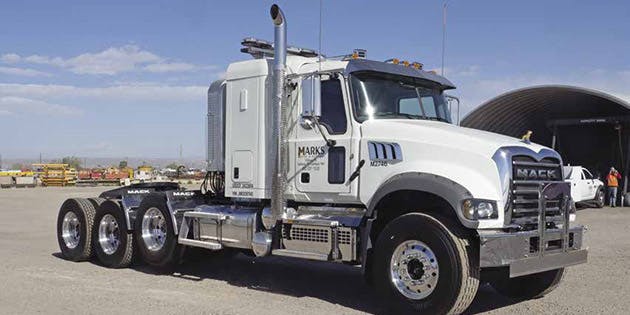HEAVY LIFTING REQUIRED
December 1, 2021

ML Crane Group has a simple mission, says the company’s president, Scott Wilson: “We lift anything too heavy for you to lift by hand. If you can’t figure out how to lift it, how to move it, how to do something with it, we probably can.”
Sounds simple, but it requires specialized equipment. ML Crane Group provides crane rental (8.5-ton to 600-ton capacity cranes), specialized rigging, heavy haul, and alternative movement solutions to a wide variety of industries across the United States. While some of the cranes are self-propelled, many travel by truck.
“We’re as much a transportation company as we are a crane and rigging company. We’re all driven by DOT road and bridge guidelines. There’s only so much weight you can put on a truck, trailer, crane, whatever that rolling device is.”
That requires a lot of trucks. Smaller cranes can travel on flatbed or a crane carrier, but once the crane gets larger than 75-ton capacity, it usually has to be divided into components for separate loads. “When you get to the larger mobile cranes, let’s say a 275-ton crane, in some places you might have one truck hauling the boom and then four or five other trucks hauling the counterweights and accessories,” Wilson says.
“Some of our larger hydraulic cranes require as many as 13 to 20 loads to get a crane to a job site. We actually have some cranes that take as many as 50 trucks to get the crane to the job site. That’s the reason our trucking and trailer fleet has to be so large. Trucks are a large portion of what we do.”
In recent years, those trucks have been Mack® Granite® and Mack® Anthem® models. Previously ML Crane Group purchased trucks based on availability and ran a mixed fleet, many of which were used trucks. Recognizing the importance of reliable and durable trucks to the company’s operations has led to a more focused approach to fleet operations, Wilson says.\
“When ML Crane Group first bought Crane Service in 2007, there was not a fleet plan and trucks were just a necessary evil to get cranes to a job site,” Wilson says. “Now, with the fleet size we operate, having a fleet plan is really important.” In addition to hauling cranes, the fleet frequently hauls the oversized and heavy haul loads their customers will want them to install. Up to 40% of the fleet’s loads require special permits.
The fleet is currently more than 240 tractors, with Macks comprising more than a quarter and growing. About 80% of the company’s 600 employees have a CDL and truck drivers are frequently equipment operators once they reach the job site. “On any given day, we could have as many as 400-500 people driving, whether on a road tractor or mobile crane. And on any given day, we could have as many as 200 trucks on the road.”
He describes the fleet’s spec as “evolution,” meaning they make changes as they learn and gain new experience in areas such as gear ratios, suspensions and automated transmissions.
The number one requirement is durability, he says. “With the local crane trucks, it’s as much off-road as it is on-road. Is the truck going to be durable? Is it going to hold up to being a work truck? We’re not just typical highway miles.”
The company’s many locations each come with a specific set of equipment challenges based on the specialized services required. Beyond what Wilson calls “basic crane service” — air conditioners, signs, general construction — each of the locations is different.
The Southwest region of New Mexico and West Texas primarily deals with energy (oil, gas, power), which means a lot of wind energy and oil facilities. Wind power means transporting the wind generators and assembling the structure, plus sometimes maintaining it. The Mid-Atlantic has a lot of construction, plants and infrastructure projects, and operates a number of tower cranes on large construction sites. Colorado has a mix of energy and large-city construction, while Chicago “has almost all of it, probably the broadest mix of all.”
The number two requirement is service support. The fleet works closely with Albuquerque’s Bruckner Truck Sales, which has helped it develop a Granite tractor spec modified to meet heavy haul needs. “Mack has had our purchases for the last two and a half years,” he says.
“A good vendor for your business learns your business and helps you make your business profitable and successful. And that’s what we feel like the Bruckner family and (Albuquerque general manager) Evan Smith have done with us.”
Wilson refers to the spec developed for ML Crane Group by Bruckner and Mack customer engineering specialists as a “hybrid heavy-haul/over-the-road truck” and has put a number of them in service now. “The trucks are very highly spec’d out, very well thought out,” he says.
Evan Smith says the Granite tractors come from Mack with factory-installed sleepers, 505 hp Mack MP®8 engines, 14-speed mDRIVE™ HD automated manual transmissions, 20,000- pound front and 46,000-pound rear Mack axles, as well as a 20,000-pound liftable pusher axle installed by Mack. The fleet then installs headache racks, fenders, tool boxes and push/pull connections. The fleet’s Granite straight trucks have 24-foot flatbeds, equipped with a 365 hp MP®7 and a 12-speed mDRIVE. The fleet has also purchased Anthem day cab tractors with 455 hp MP8 and 12-speed mDRIVE.
For big loads, the fleet operates trucks in tandem — one pushing and one pulling in the lead — which requires constant driver communication to coordinate braking and accelerating.
“Evan and the Bruckner family’s attention to detail for us have kept us purchasing Macks and kept me from even looking at anything else,” Wilson says. “They did a better job servicing our account and making our time valuable to them and giving us back our freedom to run our business.
“We’ve been really pleased with the trucks Mack’s been producing.” But durability isn’t the only thing they like about their Macks, says Wilson: “The comfort level is unmatched.”
Categories:
